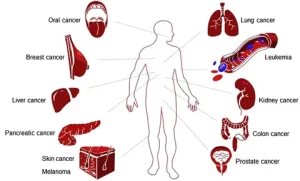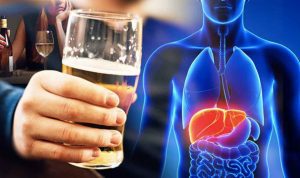Understanding the Extensive Impact
Alcohol consumption has long been recognized as a significant risk factor for various types of cancer. Delving into the intricate details reveals a nuanced connection between alcohol and heightened cancer risk across multiple organs.
Exploring Cancer Types
Breast Cancer
The risk of breast cancer increases with alcohol use, potentially due to its impact on estrogen levels. Understanding this correlation sheds light on preventive measures for individuals at risk.
Liver Cancer
Chronic alcohol consumption sets the stage for cirrhosis, a condition significantly raising the risk of liver cancer. Unraveling the dynamics of this relationship provides insights into the preventive strategies for liver-related malignancies.
Colorectal Cancer
Evidence suggests a concerning link between alcohol consumption and an elevated risk of colorectal cancers, affecting the colon and rectum. Examining this association brings forth the need for awareness and proactive health measures.
Esophageal Cancer
Drinking alcohol, especially when combined with smoking, dramatically increases the risk of esophageal cancer. Understanding the synergistic effects of these lifestyle factors becomes crucial for preventive healthcare.
Head and Neck Cancers
The umbrella of head and neck cancers, including those affecting the oral cavity, pharynx, and larynx, presents a higher risk for individuals who both consume alcohol and smoke. Delving into the specifics of this dual-risk factor scenario is imperative for targeted health interventions.
Stomach Cancer
While studies suggest a potential link between alcohol and stomach cancer, the evidence is less clear compared to other types. Examining the nuances of this association provides a comprehensive view of the overall cancer risk landscape.

Mechanisms Behind Alcohol-Induced Cancer Risk
Acetaldehyde Production
The metabolism of alcohol results in the production of acetaldehyde, a toxic chemical considered a probable human carcinogen. Understanding how acetaldehyde damages DNA and proteins unveils the molecular underpinnings of alcohol-induced cancer risks.
Oxidative Stress
Metabolizing alcohol generates reactive oxygen species, or free radicals, which can damage DNA, proteins, and cell membranes. Unraveling the intricacies of oxidative stress sheds light on the comprehensive impact of alcohol on cellular health.
Nutrient Absorption Impairment
Alcohol consumption can impair the body’s ability to absorb crucial nutrients that protect against cancer, such as folate and vitamins A, B, C, D, and E. Exploring these nutritional dynamics adds a layer of complexity to the understanding of alcohol-related cancer risks.
Hormonal Influence
Alcohol can elevate estrogen levels, a hormone associated with the risk of breast cancer. Examining how alcohol influences hormonal regulation provides valuable insights into gender-specific cancer risks.
Liver Damage
Chronic alcohol use leading to cirrhosis significantly raises the risk of liver cancer. Investigating the mechanisms behind alcohol-induced liver damage unveils critical pathways for potential interventions.
Interaction with Other Carcinogens
Alcohol can act as a solvent, enhancing the body’s exposure to tobacco and other carcinogens. For instance, understanding how alcohol increases tissue exposure to tobacco-related carcinogens provides a holistic perspective on the risks associated with combined substance use.
Direct Tissue Damage
Alcohol can directly irritate and damage the cells lining the mouth, throat, and esophagus. Exploring the consequences of this direct tissue damage uncovers the cellular changes that contribute to increased cancer risk.

Alcohol and Tobacco: A Compound Risk
Combining alcohol and tobacco exacerbates the risk of certain cancers. Individuals using both substances face a significantly higher risk, with heavy users experiencing up to a 30 times greater risk of cancers affecting the esophagus, larynx, oropharynx, and oral cavity.
Genetic Factors: Unraveling Individual Susceptibility
Genetics play a pivotal role in determining an individual’s susceptibility to alcohol-related cancers. Variants in genes like alcohol dehydrogenase (ADH) and aldehyde dehydrogenase (ALDH) influence alcohol and acetaldehyde metabolism, impacting the overall risk profile.
Understanding genetic differences in hormonal regulation further refines the assessment of alcohol’s influence on cancer risk, particularly in breast cancer. Awareness of individual genetic risks becomes a cornerstone for making informed decisions about alcohol consumption and tailoring cancer prevention strategies.
Can Drinking Red Wine Prevent Cancer?
Contrary to popular belief, no conclusive evidence supports the idea that drinking red wine or any alcohol can prevent cancer. While some studies hint at health benefits in compounds like resveratrol, the overall risks of alcohol consumption outweigh potential advantages.
Health guidelines consistently advocate for moderation or abstention from alcohol to reduce cancer risk, emphasizing the importance of considering the holistic impact on individual health.

Post-Alcohol Consumption Cancer Risk: A Dynamic Scenario
The reduction in cancer risk after stopping alcohol consumption is a dynamic process influenced by various factors. The type of cancer, the duration and intensity of previous alcohol use, and individual health factors collectively contribute to the nuanced trajectory of risk reduction.
However, it’s crucial to acknowledge that certain risks may persist, especially after prolonged or heavy alcohol use. This nuanced understanding is vital for individuals contemplating changes in alcohol consumption habits.
Alcohol and Chemotherapy: A Delicate Balancing Act
During chemotherapy, it is generally advisable to either avoid or limit alcohol consumption. The potential interactions between alcohol and chemotherapy drugs, exacerbation of side effects, and the impact on liver function necessitate a careful approach.
Consulting with a healthcare team to discuss alcohol use becomes imperative, ensuring personalized guidance tailored to the specific implications for treatment and overall health.

Summing Up: Navigating Health Choices
In summary, public health guidelines consistently advocate for moderation or complete abstinence from alcohol to mitigate the risks of developing cancer. However, the landscape of individual risks is intricate and varies significantly.
Considering personal and family medical history becomes paramount when making decisions about alcohol consumption. Moreover, understanding individual genetic factors provides a valuable tool for tailoring cancer prevention strategies.
The complex interplay of alcohol with biological mechanisms, genetic variations, and lifestyle factors underscores the need for comprehensive awareness. As we navigate the intricate terrain of alcohol and cancer risk, staying informed and making choices aligned with individual health priorities is key.











